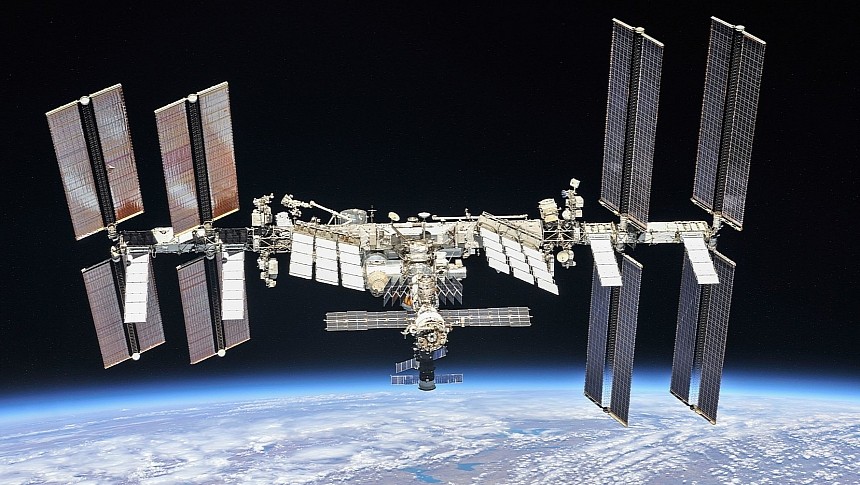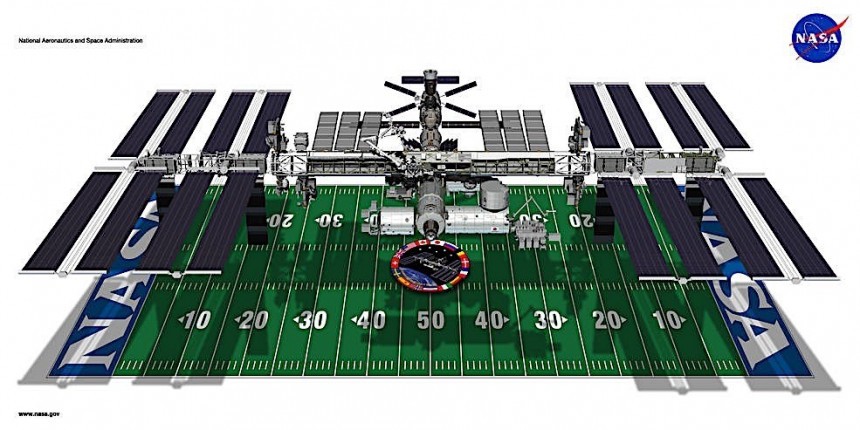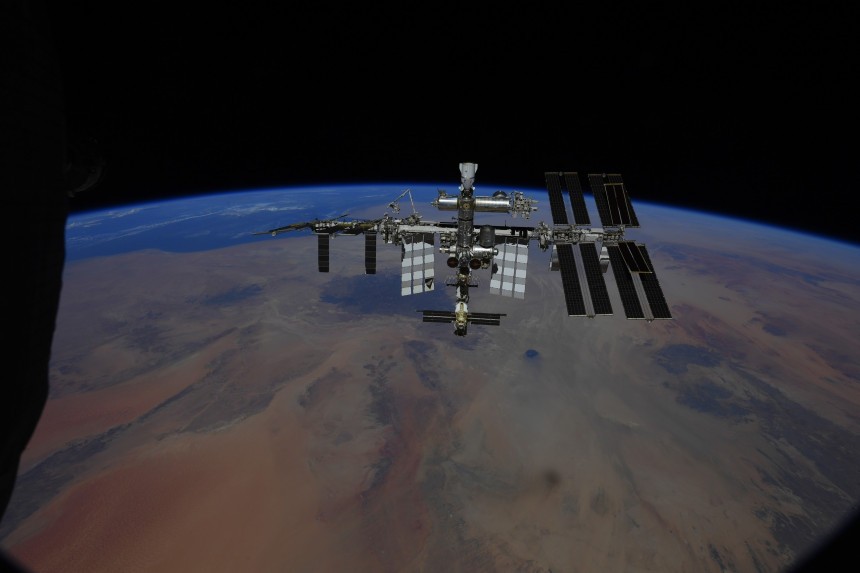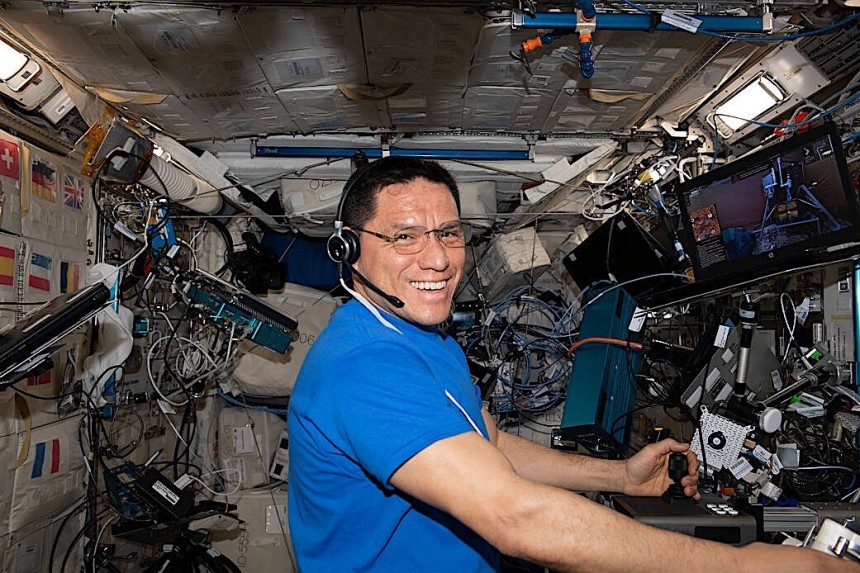A few days ago from the time of writing this, the science editor at the Guardian, Robin McKie, penned an editorial titled, ‘It only makes the news when the toilets stop working’: has the 25-year-old International Space Station been a waste of space? Here, he lays out why some see the International Space Station's 25th anniversary in orbit not as a triumph but rather an over-rated, over-hyped financial albatross that would've been better off shelved for more exciting initiatives in space.
As a life-long admirer of the ISS since childhood, it was easy for me to get triggered by what I saw to be a pretty inflammatory byline. But instead of blasting the page with hate comments, I did a novel thing these days and read the gosh-darn thing. What I read didn't so much anger me, but rather, it got my noggin joggin' with some of the points presented. But to understand why Robin McKie actually has a point with a lot of what he says and why the headline is a touch on the hyperbolic side, we need to break each point made piece by piece.
Now, it's important to note that Robin McKie has had a storied and illustrious career in scientific journalism, particularly on the medical research side of things, stretching back to well before I was a speck in my parent's eyes. So it's safe to say the informed opinions he's presented from the pro and anti-ISS sides of things are legitimate. It's also not to say he himself disapproves nor approves of the ISS personally; that just had to be noted before pressing ahead. Without further delay, what critiques could an expert in contemporary technology beat reporting have with something objectively badass as a giant space station?
One less apparent answer lies not with any hardware on ISS itself but rather with the gargantuan costs it took to build it as it is today. £120 billion went into building ISS from a single founding Russian Module, Zarya, to a 16 pressurized-module leviathan by McKie's own estimation. That's around $148.5 billion in American money over the 25-ish year operational life of ISS, plus the decade or two of R&D that preceded the program via the prior American space station, Skylab, and Russia's Mir.
Now, it's not like space stations grow on trees. Even the most penny-pinching Congress bureaucrat figures a nation-defining space project of ISS's magnitude is bound to cost a fortune. But truthfully, all of that is pretty much beside the point. Because at the same time that ISS was being developed, America's Congress under the Presidency of Bill Clinton had to pick between two scientific initiatives to define a generation. One of the two options was a project first dubbed Space Station Freedom. After merging with the post-Soviet Mir 2 program, this project ultimately became the International Space Station.
But option two was an initiative called the Superconducting Super Collider (SSC). In a timeline where the House of Representatives sided with the SSC facility built to house the world's largest particle accelerator, now run by a petrochemical company of all things, it would have been used for its intended purpose. So to say, without ISS, the Large Hadron Collider in Geneva, Switzerland, would have resided in Northeast Texas, not Central Europe. As Robin McKie points out, it makes sense that a particle accelerator of SSC's magnitude could have more swift practical applications in everyday life than a space station.
But in a modern science sector where international collaboration is often the rule rather than the exception, it's difficult to say the U.S. didn't derive anything positive from the Swiss leviathan that was ultimately built. Though not a member state of the CERN pan-European nuclear research pact that operates the Large Hadron Collider, American scientists, contractors, and engineers played no small role in LHC's construction and long-term operation to this day. Less than a five-hour drive away from LHC, the ITER nuclear fusion megaproject based in Southern France with personnel from all walks of life also employs Americans in great numbers.
No one's saying it wouldn't be wicked if the world's largest particle accelerator were a Texan rather than a Swiss. But to say the change in location was worth swiping left on the most extraordinary human-crewed spacecraft the world has ever seen would be inaccurate in the kindest terms. Meanwhile, the nagging problem of the Large Hadron Collider becoming a Nobel Prize in Physics factory can best be retorted by saying Nobel Prizes are the STEM equivalent of the Oscars or Grammys. A whole gaggle of shiny awards doesn't automatically negate the usefulness of projects without the same accolades.
But besides the budget, Robin McKie boldly ponders whether ISS truly made enough advancements in practical deep-space science to justify its colossal long-term budget in the first place. More to the point, if ISS is a real wonder of the modern world, like a floating Giza Pyramid in low-Earth orbit, why is it that most media only seems to acknowledge its existence "when the toilets stop working," as McKie's editorial title points out? Well, once again, it's hard to say this lack of coverage lies at the feet of ISS itself.
Across the board, space travel has a much lower priority on most major TV news broadcasts than it did in, say, the Apollo era. Well north of half a billion people watched Neil Armstrong make his one giant leap for mankind live on broadcast news worldwide. According to streamcharts.com, a peak of only 884,033 people tuned into NASA's stream of Artemis I's launch in November of last year. Of course, nobody stepped on the lunar surface during Artemis I, as was no one aboard last year's Orion spacecraft transit around the Moon.
But even so, the contrast between Apollo's numbers and Artemis can't help but get you thinking about what modern media prioritizes broadcasting these days. But to answer one more question, I think it's pretty self-evident that ISS more than paid for itself in the space research department. For a quarter-century, the insights into long-term human sustainability outside the confines of Earth allow humanity to compensate for the physiological challenges associated with interplanetary human-crewed space missions without using the un-scientific method of throwing cupcakes at the wall and seeing what sticks.
It's because ISS amassed such a breadth of information about how human bodies work in deep space that NASA and its strategic partners can implement these innovations into spacecraft legitimately heading to Mars one day. Because trial and error followed by huge explosions are more associated with the old Soviet space program than anything modern, a cosmological soft opening like ISS operates like the minor leagues of deep space travel. Meaning, of course, landing humans on Mars would be like winning the World Series.
Don't believe us? Just ask astronaut Frank Rubio, the man who just shattered the American record for time spent in space aboard ISS, how much you can learn after 370 days in space. Because of his efforts, we can say for certain a human being can survive a trip through space long enough to reach Mars and still be in reasonably good health. The only force stopping science from pushing things further is the lack of an absolute mad lad willing to volunteer to stay up even longer. We'll grant that ISS is remarkably tin can-shaped compared to contemporary space station designs from private companies like Axiom Space. But hey, one had to walk before the other could run. It's hard to argue with that logic.
We want to extend all the respect in the world to Robin McKie for presenting a well-rounded, unbiased critique of the International Space Station. It'd be untrue to say any of the commentaries presented result from embellishment or exaggeration. But to say these faults make ISS in any way a "waste of space," as McKie explains, people out there actually believe, yeah, that's where you lose us. As we blow out 25 candles for ISS this month, it's essential to integrate its minor downsides into the same story of its considerable upside. In this case, the good outweighs the bad every day of the week.
Now, it's important to note that Robin McKie has had a storied and illustrious career in scientific journalism, particularly on the medical research side of things, stretching back to well before I was a speck in my parent's eyes. So it's safe to say the informed opinions he's presented from the pro and anti-ISS sides of things are legitimate. It's also not to say he himself disapproves nor approves of the ISS personally; that just had to be noted before pressing ahead. Without further delay, what critiques could an expert in contemporary technology beat reporting have with something objectively badass as a giant space station?
One less apparent answer lies not with any hardware on ISS itself but rather with the gargantuan costs it took to build it as it is today. £120 billion went into building ISS from a single founding Russian Module, Zarya, to a 16 pressurized-module leviathan by McKie's own estimation. That's around $148.5 billion in American money over the 25-ish year operational life of ISS, plus the decade or two of R&D that preceded the program via the prior American space station, Skylab, and Russia's Mir.
Now, it's not like space stations grow on trees. Even the most penny-pinching Congress bureaucrat figures a nation-defining space project of ISS's magnitude is bound to cost a fortune. But truthfully, all of that is pretty much beside the point. Because at the same time that ISS was being developed, America's Congress under the Presidency of Bill Clinton had to pick between two scientific initiatives to define a generation. One of the two options was a project first dubbed Space Station Freedom. After merging with the post-Soviet Mir 2 program, this project ultimately became the International Space Station.
But in a modern science sector where international collaboration is often the rule rather than the exception, it's difficult to say the U.S. didn't derive anything positive from the Swiss leviathan that was ultimately built. Though not a member state of the CERN pan-European nuclear research pact that operates the Large Hadron Collider, American scientists, contractors, and engineers played no small role in LHC's construction and long-term operation to this day. Less than a five-hour drive away from LHC, the ITER nuclear fusion megaproject based in Southern France with personnel from all walks of life also employs Americans in great numbers.
No one's saying it wouldn't be wicked if the world's largest particle accelerator were a Texan rather than a Swiss. But to say the change in location was worth swiping left on the most extraordinary human-crewed spacecraft the world has ever seen would be inaccurate in the kindest terms. Meanwhile, the nagging problem of the Large Hadron Collider becoming a Nobel Prize in Physics factory can best be retorted by saying Nobel Prizes are the STEM equivalent of the Oscars or Grammys. A whole gaggle of shiny awards doesn't automatically negate the usefulness of projects without the same accolades.
But besides the budget, Robin McKie boldly ponders whether ISS truly made enough advancements in practical deep-space science to justify its colossal long-term budget in the first place. More to the point, if ISS is a real wonder of the modern world, like a floating Giza Pyramid in low-Earth orbit, why is it that most media only seems to acknowledge its existence "when the toilets stop working," as McKie's editorial title points out? Well, once again, it's hard to say this lack of coverage lies at the feet of ISS itself.
But even so, the contrast between Apollo's numbers and Artemis can't help but get you thinking about what modern media prioritizes broadcasting these days. But to answer one more question, I think it's pretty self-evident that ISS more than paid for itself in the space research department. For a quarter-century, the insights into long-term human sustainability outside the confines of Earth allow humanity to compensate for the physiological challenges associated with interplanetary human-crewed space missions without using the un-scientific method of throwing cupcakes at the wall and seeing what sticks.
It's because ISS amassed such a breadth of information about how human bodies work in deep space that NASA and its strategic partners can implement these innovations into spacecraft legitimately heading to Mars one day. Because trial and error followed by huge explosions are more associated with the old Soviet space program than anything modern, a cosmological soft opening like ISS operates like the minor leagues of deep space travel. Meaning, of course, landing humans on Mars would be like winning the World Series.
Don't believe us? Just ask astronaut Frank Rubio, the man who just shattered the American record for time spent in space aboard ISS, how much you can learn after 370 days in space. Because of his efforts, we can say for certain a human being can survive a trip through space long enough to reach Mars and still be in reasonably good health. The only force stopping science from pushing things further is the lack of an absolute mad lad willing to volunteer to stay up even longer. We'll grant that ISS is remarkably tin can-shaped compared to contemporary space station designs from private companies like Axiom Space. But hey, one had to walk before the other could run. It's hard to argue with that logic.






















